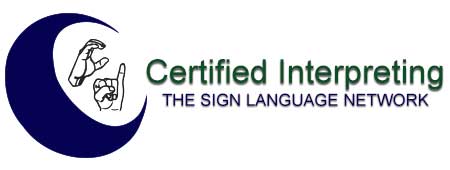INTERPRETING OVERVIEW
Interpreting is essentially a multi-step process which includes: receiving a message in one language, grasping it’s meaning and intent, and delivering it into another language. This is a simple definition of a complex process which requires sophisticated linguistic, cognitive, and technical skills.
The interpreter seeks to bring conceptual equivalence from the source language to the target language. However, this cannot be achieved in a word-for-sign parity, as such does not exist between two distinct languages. Linguistically, English and American Sign Language (ASL) are as different from each other as any other two languages. Additionally, the modality difference (auditory vs. visual) between the two languages presents some unique challenges.
Rather than merely translating words or signs, a professional interpreter seeks
to achieve equivalence by conveying the spirit and intent of the message.
In simultaneous interpreting situations, an interpreter is presented with the challenge of immediately comprehending the message from the source language and just as quickly conveying what is understood into the target language. There is little luxury of time during a presentation or a typical dialogue.
“Interpreting is a task that requires quick thinking and nerves of steel.”
Danica Seleskovitch
A professional signed language interpreter needs to be fluent in both ASL and English so as to grasp and formulate thoughts in both languages. Thus, in addition to being skilled in ASL, training is needed in developing the interpreting processing skills critical for successful interpretation.
Interpreters also need to be versatile in adapting to a variety of communication styles, settings, register, and modalities. Sometimes interpreters are needed for DeafBlind interpreting and signed or oral transliterations as well.
PROFESSIONALISM
Interpreters encounter a wide variety of situations ranging from public events to very personal medical and counseling settings. Both the Deaf and hearing parties involved need to be assured that the interpreter is a skilled professional who will accurately convey the intent of what has been communicated.
Additionally, interpreters often deal with sensitive or private information, and for this reason, always hold what is discussed during interpretation in the highest confidence. A professional code of conduct governs the work of interpreters which can be accessed on Standard Of Professional Interpreting.
The Registry of Interpreters for the Deaf (RID), a national organization advocating for the signed language interpreting profession, had developed a national certification system. While this certification system is currently under review, interpreters have been required to meet a minimum amount of training, successfully complete an initial written test, and pass a performance evaluation.
Other organizations offer specialized interpreting evaluations such as the Educational Interpreter Performance Assessment. Click on EIPA for more information.
Additionally, the State of Maine requires that all interpreters who live and work in the state be licensed. See Interpreting in Maine for more details.
Interpreters continue to improve their skills, knowledge, and professionalism through active participation in language enhancement and interpreter training. Additionally, there is also membership in the national RID and/or the local MaineRID. An increasing number of interpreters have completed college or university interpreter education programs, earning associates, bachelors, and/or masters degrees in interpreting.
WHO NEEDS AN INTERPRETER?
Anytime communication is necessary between users of ASL and English, a professional interpreter may meet the need. Such situations include:
- Staff meetings
- Workshops & conferences
- Specialized and in-service training
- New hire and on-the-job training
- Mental Health counseling and therapy
- Government agency events and meetings
- Educational settings: primary, secondary, and post-secondary
- Medical settings
- Legal and professional services
- Consultation and mediation
- Performing arts
- Recreational, sporting, and special events
TEAM INTERPRETING WITH A DEAF INTERPRETER
There are times when a Deaf person included in an event has limited ability in ASL, uses atypical signed language, or a more gestural form of communication which differs from mainstream ASL. This could be influenced by region, culture, age, literacy, education, class, or physical, cognitive, and mental health. In such situations two interpreters, a hearing interpreter and a specialist interpreter who is Deaf, team up to assure clear and accurate communication. The Deaf interpreter is one who has both training and background in communicating with Deaf persons with various types of communication styles. FMI, see: Deaf Interpreter
AM I REQUIRED TO HIRE AN INTERPRETER?
The Americans with Disabilities Act (ADA) was enacted so that organizations, profit and non-profit, would make their services reasonably accessible to Deaf and Hard-of-Hearing persons, as well as to disabled persons in general.
To view this law and how it may apply to you, see the ADA website of the United States Department of Justice.
HOW CAN I LEARN TO INTERPRET?
Prior to participating in any interpreter training, prospective interpreters need to develop fluency in both ASL and English. Such language acquisition opportunity may also be a part of most interpreter training programs. For further information on ASL acquisition, see Learn ASL.
There are a number of interpreter training programs in Maine and New England. Locally, the interpreter training program at the University of Southern Maine (USM) is currently offering a variety of coursework in ASL and interpreter development. FMI, see: USM ITP.



